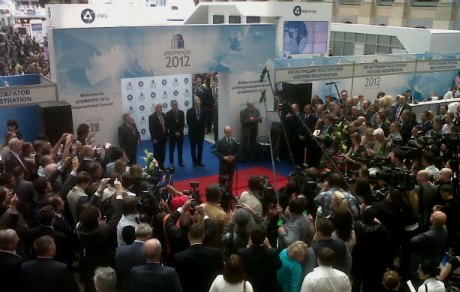 |
| Rosatom director general Sergei Kiriyenko opens AtomExpo 2012 today |
Nigeria signed a cooperation accord with Russia towards the construction of its first nuclear power plant today at the AtomExpo event in Moscow. Bangladesh and South Africa also agreed to extend their nuclear cooperation with Russia.
Rosatom chief Sergei Kiriyenko signed a memorandum of understanding with the chairman of the Nigerian Atomic Energy Commission, Franklin Erepamo Osaisai. Its terms will see the two countries "prepare a comprehensive program of building nuclear power plants in Nigeria," including the development of infrastructure and a framework and system of regulation for nuclear and radiation safety.
It was noted that one of the most important areas for cooperation was to establish the proper educational structure for Nigerian professional skills in nuclear physics and energy. The country is seen as one of the most serious and promising to be exploring the future use of nuclear energy. In 2010 Nigeria said it aimed to have 1000 MWe of nuclear generation in place by 2019 with another 4000 MWe online by 2030. Increasing power production is a major priority in order to end the unreliability of power supply that millions of people suffer, while adding non-fossil generation also would allow Nigeria to capitalise on exports of liquified natural gas.
Another country that has been cooperating with Russia on its road to employing nuclear power is Bangladesh and Kiriyenko also used AtomExpo as the public event to announce two new memorandums with that country. One concerned the setting-up of a public information centre in Bangladesh which it is hoped will raise the profile of nuclear work in civil society and among young people; the other was a mutual agreement on nuclear training that included sending a 'pilot group' of Bangladeshi students to Russian institutions. Signing both of these for Bangladesh was the minister for science and technology, Yafesh Osman.
Opening ceremony
AtomExpo takes the form of an exhibition showcase of the Russian industry with side events and forums covering current topics. Officially opening the event today, Kiriyenko noted the attendance of 1300 people representing regular and new exhibitors. He said "the nuclear world is coming back to normal development" one year on from the shock of the Fukushima accident, adding that Rosatom's order book had doubled in the last year. This bore witness to "the high degree of trust in our industry," he said, because "strategic partnerships are the keystone" of an industry with product that remain in operation for 60 to 80 years.
Another country in discussions with Russia about its nuclear future is South Africa, which is developing plans for a build programme of about 9.6 GWe of new nuclear capacity starting from 2024. Attending AtomExpo and speaking at the opening ceremony was Dipuo Peters, the country's minsiter of energy.
Although South Africa already employs nuclear energy, Peters summarised the situation for many nations when she explained how the "ferocious appetite" for energy "requires the use of all sources of available to mankind." It is our colleactive duty, she said, "to make sure energy is provided in a safe, affordable and secure manner."
Peters urged the manufacturers present to consider their role in creating "meaningful employment" in countries to which they export. She added that the Nuclear Industry Association of South Africa (NIASA) has held joint workshops on Russian technology opportunities.
This relationship was expanded today by an agreement between Rosatom and the Nuclear Energy Corporation of South Africa (Necsa) to "elaborate joint business projects in such areas as the production and marketing of medical isotopes, nuclear fuel fabrication and the production of power equipment." This was signed in the presence of Kiriyenko and Peters by Necsa executive director Mapula Letsoalo and RuSat overseas CEO Alexei Kalinin.
Researched and written
by World Nuclear News




_53504.jpg)

_13505.jpg)
_87975.jpg)






